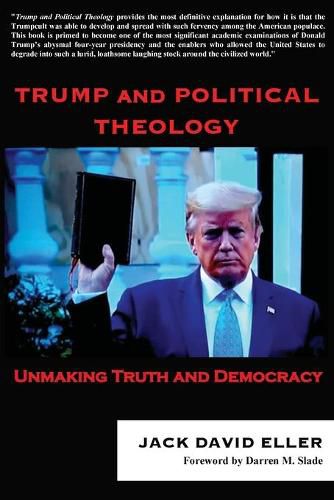Readings Newsletter
Become a Readings Member to make your shopping experience even easier.
Sign in or sign up for free!
You’re not far away from qualifying for FREE standard shipping within Australia
You’ve qualified for FREE standard shipping within Australia
The cart is loading…






This title is printed to order. This book may have been self-published. If so, we cannot guarantee the quality of the content. In the main most books will have gone through the editing process however some may not. We therefore suggest that you be aware of this before ordering this book. If in doubt check either the author or publisher’s details as we are unable to accept any returns unless they are faulty. Please contact us if you have any questions.
For millennia, a fundamental question of culture and law has been the relationship between religion and ruler, or more recently between church and state. Although the term political theology was not always known, the question remained and was answered in various ways: theocracy, the divine right of kings, the mandate of heaven, the rule of jurists, and so forth. Almost a century ago, Carl Schmitt revived political theology and reshaped it into a less theological and more political subject with his famous notions of sovereignty and the exception. Schmitt highlighted the eternal struggle between power or authority on the one hand and positive law and political institutions on the other, arguing that law can never entirely legitimize or constrain power or authority and that the real site and source of law is the moment of exception and of the decision.
Trump and Political Theology applies this Schmittian lens to Donald Trump, an exceptional president who seems to use his executive and decision-making power to flaunt law and truth, to cripple and discredit institutions, and to bend reality to his will. The book considers first whether Trump is an aspiring Schmittian sovereign and therefore a threat to democracy. But it goes beyond Trump and Trumpism to critique and rethink political theology in the light of contemporary, especially populist and authoritarian, politics. Finally, it compels us to critique and rethink theology itself as a tool for understanding and organizing politics and society, restoring the relevance of myth and ritual and of pre-Christian and non-Christian characters like the shaman and the trickster for modern politics and social theory.
$9.00 standard shipping within Australia
FREE standard shipping within Australia for orders over $100.00
Express & International shipping calculated at checkout
This title is printed to order. This book may have been self-published. If so, we cannot guarantee the quality of the content. In the main most books will have gone through the editing process however some may not. We therefore suggest that you be aware of this before ordering this book. If in doubt check either the author or publisher’s details as we are unable to accept any returns unless they are faulty. Please contact us if you have any questions.
For millennia, a fundamental question of culture and law has been the relationship between religion and ruler, or more recently between church and state. Although the term political theology was not always known, the question remained and was answered in various ways: theocracy, the divine right of kings, the mandate of heaven, the rule of jurists, and so forth. Almost a century ago, Carl Schmitt revived political theology and reshaped it into a less theological and more political subject with his famous notions of sovereignty and the exception. Schmitt highlighted the eternal struggle between power or authority on the one hand and positive law and political institutions on the other, arguing that law can never entirely legitimize or constrain power or authority and that the real site and source of law is the moment of exception and of the decision.
Trump and Political Theology applies this Schmittian lens to Donald Trump, an exceptional president who seems to use his executive and decision-making power to flaunt law and truth, to cripple and discredit institutions, and to bend reality to his will. The book considers first whether Trump is an aspiring Schmittian sovereign and therefore a threat to democracy. But it goes beyond Trump and Trumpism to critique and rethink political theology in the light of contemporary, especially populist and authoritarian, politics. Finally, it compels us to critique and rethink theology itself as a tool for understanding and organizing politics and society, restoring the relevance of myth and ritual and of pre-Christian and non-Christian characters like the shaman and the trickster for modern politics and social theory.